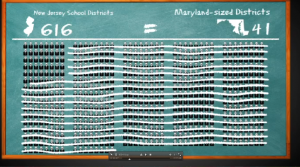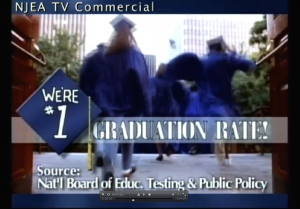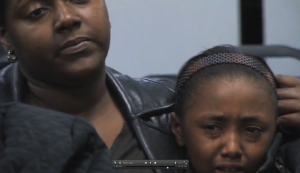Bob Bowdon, a former television host and reporter from New Jersey produces “The Cartel,” a documentary that takes a look inside the failing American School system. The documentary flips through broadcasts, interviews, news articles and documents that address the enormous issue of public education in America. America is always thought to be the best, at least we like to think so, but scores of the PISA test prove our education is not. PISA is an international math exam given every three years, with an average score of 500 in most countries. America, however, scored a 474, which falls below countries with less developed economies (Bowdon, 0:02:32). While America has lower PISA scores, it ,spends more money per student on education than any other country in the world (Bowdon,0:03:34). “The Cartel” focuses mainly on the state of New Jersey, because New Jersey’s education system shows that despite adequate funding, schools are failing.
Teacher unions, as Bowdon believes, are bad for improving education because they protect bad teachers. In this documentary, there are several accounts where teachers were not doing their job but because of tenure it has been difficult to fire them. Tenure and teacher unions are two parts of the system that contribute to the failing schools. Bowdon also discusses the tremendous amount of spending on administration. An interview with Lee Seglem discusses a particular case where there was a ‘clash in leadership styles.’ The superintendent agreed to resign and the Board of Education paid $470,000 dollars for someone that only worked at the school for a year (Bowdon, 0:12:39). This is just one of many examples of excessive administrative spending. The National Board of Education is spending money in the wrong places and the schools are failing as a result. Education spending is one of Bowdon’s explicit theories of change. The screenshot compares the number of superintendents in New Jersey and Maryland. Maryland, a similar state in terms of size, has a population density but on 24 school districts, whereas New Jersey has 616 school districts.  Due to the large number of districts, New Jersey spends more money on employing superintendents. As a result, if they cut back on this unnecessary spending they could put more money into teachers salaries. The money should be put into the schools and the teachers salaries rather than paying the administration.
Due to the large number of districts, New Jersey spends more money on employing superintendents. As a result, if they cut back on this unnecessary spending they could put more money into teachers salaries. The money should be put into the schools and the teachers salaries rather than paying the administration.
Another important example of how the teachers union is bad is in the false advertising for New Jersey education.  This screenshot, for example, says that New Jersey has the highest graduation rate- this is false. The commercial that was televised includes SRA (Special Review Assessment) that is an alternative program, and that is 100% entry 100% output (Bowdon,1:04:00). New Jersey drops to 24th in the country when you do not include the SRA. Instead of trying to improve education in New Jersey to become the #1 in graduation rate, the teachers union is promoting education to the public under false pretenses ( Bowdon,0:28:42). Bowdon also talks about Camden, which has the highest drop out rate and lowest scores in New Jersey. In fact, the number of students in the 9th grade is almost equivalent to students in the 10th 11th and 12th grade combined (Bowdon, 0:27:32). There is an interview with a boy, Juan, who is in 9th grade at Camden and doesn’t know the alphabet (Bowdon, 0:45:31);this truly speaks to the level of poor education. Violence has become a huge issue in Camden and is a direct result of these poorly run school districts. The Police Chief of Camden said himself that it was a miracle that he was able to leave the public school ( Bowdon,0:36:12).
This screenshot, for example, says that New Jersey has the highest graduation rate- this is false. The commercial that was televised includes SRA (Special Review Assessment) that is an alternative program, and that is 100% entry 100% output (Bowdon,1:04:00). New Jersey drops to 24th in the country when you do not include the SRA. Instead of trying to improve education in New Jersey to become the #1 in graduation rate, the teachers union is promoting education to the public under false pretenses ( Bowdon,0:28:42). Bowdon also talks about Camden, which has the highest drop out rate and lowest scores in New Jersey. In fact, the number of students in the 9th grade is almost equivalent to students in the 10th 11th and 12th grade combined (Bowdon, 0:27:32). There is an interview with a boy, Juan, who is in 9th grade at Camden and doesn’t know the alphabet (Bowdon, 0:45:31);this truly speaks to the level of poor education. Violence has become a huge issue in Camden and is a direct result of these poorly run school districts. The Police Chief of Camden said himself that it was a miracle that he was able to leave the public school ( Bowdon,0:36:12).
School Choice is a big part of Bowdon’s research. He believes that more vouchers should be given to students. It isn’t fair for a child to have poor education just because they do not have money to live in areas with the best public schools. Students should be given more vouchers that would give them the ability to go to a charter or private school and get out of the poor public school system (Bowdon, 1:28:03). Bowdon does a great job at reaching the viewers when he shows a district in New Jersey Charter school lottery. As you can see in this screenshot, the little girl is heart broken that her name was not called. This scene really gets to the viewer because an innocent child was just praying that she would have the opportunity to go to a better school. Everyone’s child should have the right to a good education.
As you can see in this screenshot, the little girl is heart broken that her name was not called. This scene really gets to the viewer because an innocent child was just praying that she would have the opportunity to go to a better school. Everyone’s child should have the right to a good education.
Some feel that the documentary failed at portraying poor education in America by focusing on a single state. New York Times article “Children Left Behind,” by Catsoulis, shares the opinion that the documentary is just a bunch of television clips and interviews of people trash-talking the schools in New Jersey. Catsoulis describes The Cartel as “Visually horrid and intellectually unsatisfying,” however, I found it very enlightening (Castroulis). I do believe, that the documentary would have been more effective if it spoke about education in America as a whole rather than just one state. I feel as though the random television clips and articles made it a bit confusing and overwhelming.
I do not believe that School Choice reform is a good reform because even though it gives students an opportunity, that opportunity lies in the hands of their parents. The districts that use School Choice are in poor areas usually where parents might not have the intelligence to make the right decision for their child. What would improve School Choice reform in my opinion would be similar to the Harlem District Zone proposed by Geoffrey Canada. The goal of the Harlem District Zone is to improve education but also educate the parents of Harlem, so that they can make the right decisions for their children (Tough, 23). School Choice reform with an addition of a course to educate the parents in these districts would be much more successful in my opinion. If a course similar to the one proposed by Canada was included to School Choice the reform would not be as flawed. Despite the tremendous spending in our schools, they are still poorly run, which speaks to what those in the system are doing. The money and power is in the hands of people who are corrupting the system and hurting the lives of the children in America. The future of our country is in the hands of our education system and our educators.
Work Cited
Catsoulis, Jeannette. “Children Left Behind.” New York Times. New York Times, 15 April 2010. Web. 22 February 2014.
“’The Cartel’ Director Bob Bowdon on Education Reform” Youtube.Youtube, 26 May 2010. Web. 23 February 2014.
The Cartel, created and directed by Bob Bowdon. 2010.
Tough,Paul. Whatever It Takes: Geoffrey Canada’s Quest to Change Harlem and America. New York:Mariner Books, 2009. Print.
Your video analysis sheds light on the negatives of teacher unions. I thought this was informative because the documentary I watched, American Teacher, focused on protecting teachers. Ravitch’s book also shows how teachers unions can be beneficial, but The Cartel does have some validity in believing it could protect teachers that aren’t performing well.
Tori,
I also watched “The Cartel” and found that Bowdon stressed that teacher unions and tenure are an issue in American school systems as they protect “bad teachers” and restrict good teachers from going the extra mile for their students. I like how you refer to the screen shots (however I think it would make a little more sense to the reader if the screen shots were near the paragraph they were talked about in). The screen shots illustrate each point that Bowdon made in his documentary and I enjoyed reading your post as it was a bit similar to my interpretation of Bowdon’s points. Overall I enjoyed reading your post and like how you include some criticisms of the film as well as your views on the film.
I felt your article does a great job explaining the documentary and the issues it discussed in regards to educational reform. I have not seen the documentary, but for someone who has not I feel you really explained the documentary clearly and some of your own views about how the documentary may have improved. I do wish you went into more detail about your own thoughts about the issues the documentary raised; however, you do a great job at analyzing and bringing in other criticism about “The Cartel.” Based on your article, I also feel that the documentary might have been better if it chose to have a more holistic approach. Overall, great report and analysis.